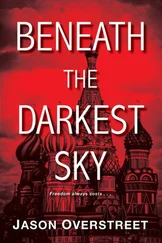“What did he say?” Port inquired.
“Oh, he merely went on with his lecture. He’d learned it by rote, of course. He did stare. They all do. But I think he respected me for not being afraid. The ruder you are to them the more they admire you. I showed him I knew he was telling me the most fearful lot of lies. Catholics! I daresay they think that makes them superior. It was too funny, when they were all most Jewy; one had only to look at them. Oh, I know Jews. I’ve had too many vile experiences with them not to know them.”
The novelty of the caricature was wearing off. Port was beginning to feel smothered sitting there between them; their obsessions depressed him. Mrs. Lyle was even more objectionable than her son. Unlike him, she had no exploits, imaginary or real, to recount; her entire conversation consisted of descriptions in detail of the persecutions to which she believed she had been subjected, and of word-by-word accounts of the bitter quarrels in which she had been engaged with those who harassed her. As she spoke, her character took shape before him, although already he was far less inclined to be interested in it. Her life had been devoid of personal contacts, and she needed them. Thus she manufactured them as best she could; each fight was an abortive attempt at establishing some kind of human relationship. Even with Eric, she had come to accept the dispute as the natural mode of talking. He decided that she was the loneliest woman he had ever seen, but he could not care very much.
He ceased listening. They had left the town, traversed the valley, and were climbing a large, bare hill on the other side. As they swung around one of the many S-curves, he realized with a start that he was looking straight at the Turkish fortress, small and perfect as a toy at this distance, on the opposite side of the valley. Under the wall, scattered about on the yellow earth, were several tiny black tents; which one he had been in, which one was Marhnia’s, he could not say, for the staircase was not visible from here.
And there she was, doubtless, somewhere below in the valley, having her noonday sleep in the airless heat of a tent, alone or with a lucky Arab friend—not Smaïl, he thought. They turned again, mounting ever higher; there were cliffs above them. By the road sometimes were high clumps of dead thistle plants, coated with white dust, and from the plants the locusts called, a high, unceasing scream like the sound of heat itself. Again and again the valley came into view, always a little smaller, a little farther away, a little less real. The Mercedes roared like a plane; there was no muffler on the exhaust pipe. The mountains were there ahead, the sebkha was spread out below. He turned to get a last look at the valley; the shape of each tent was still discernible, and he realized that the tents looked like the mountain peaks behind them on the horizon.
As he watched the heat-covered landscape unfold, his thoughts took an inward turn, dwelt briefly on the dream that still preoccupied him. At the end of a moment, he smiled; now he had it. The train that went always faster was merely an epitome of life itself. The unsureness about the no and the yes was the inevitable attitude one had if one tried to consider the value of that life, and the hesitation was automatically resolved by one’s involuntary decision to refuse participation in it. He wondered why it had upset him; it was a simple, classic dream. The connections were all clear in his head. Their particular meaning with regard to his own life scarcely mattered. For in order to avoid having to deal with relative values, he had long since come to deny all purpose to the phenomenon of existence—it was more expedient and comforting.
He was pleased to have solved his little problem. He looked around the countryside; they were still climbing, but they had gone over the first crest. About them now were barren, rounded hills, without details to give them scale. And on every side was the same uneven, hard line of the horizon, with the blinding white sky behind. Mrs. Lyle was saying: “Oh, they’re a foul tribe. A rotten lot, I can tell you.” “I’ll kill this woman yet,” he thought savagely. As the gradient lessened and the car added speed, the fleeting illusion of a breeze was created, but when the road curved upward again and they resumed the slow ascent, he realized that the air was motionless.
“There’s a sort of belvedere up ahead, according to the map,” said Eric. “We ought to have a superb view.”
“Do you think we should stop?” Mrs. Lyle inquired anxiously. “We must be at Boussif for tea.”
The vantage point proved to be a slightly perceptible widening of the road at a spot where the latter made a hairpin curve. Some boulders which had rolled down from the cliff on the inner side made the passage even more hazardous. The drop from the edge was sheer, and the view inland was spectacular and hostile.
Eric stopped the car for a moment, but no one got out. The rest of the drive was through stony territory, too parched to shelter even the locusts, yet now and then Port caught a glimpse in the distance of a mud-walled hamlet, the color of the hills, fenced round about with cactus and thorny shrubs. A silence fell upon the three, and there was nothing to hear but the steady roaring of the motor.
When they came in sight of Boussif with its modern white concrete minaret, Mrs. Lyle said: “Eric, I want you to attend to the rooms. I shall go directly to the kitchen and set about showing them how to make tea.” To Port she said, holding up her handbag: “I always carry the tea here in my bag with me when we’re on a voyage. Otherwise I should have to wait forever while that wretched boy attended to the automobile and the luggage. I believe there’s nothing at all to see in Boussif, so we shall be spared going into the streets.”
“Derb Ech Chergui,” said Port. And as she turned to look at him in astonishment, “I was just reading a sign,” he said reassuringly. The long main street was empty, cooking in the afternoon sun, whose strength seemed doubled by the fact that over the mountains ahead to the south still hung the massive dark clouds that had been there since the early morning.
It was a very old train. From the low ceiling in the corridor of their carriage hung a row of kerosene lamps that swung violently back and forth in unison as the ancient vehicle rocked along. When they had been about to pull out of the station, Kit, in the usual desperation she felt at the beginning of a train ride, had jumped down, run over to the newsstand, and bought several French magazines, getting back aboard just as they were starting up. Now, in the indistinct mixture of fading daylight and the yellow glow cast by the dim lamps, she held them on her lap and opened one after the other, trying to see what was in them. The only one she could see at all was full of photographs: Cine Pour Tous.
They had the compartment to themselves. Tunner sat opposite her.
“You can’t read in this light,” he said.
“I’m just looking at pictures.”
“Oh.”
“You’ll excuse me, won’t you? In a minute I won’t even be able to do this much. I’m a little nervous on trains.”
“Go right ahead,” he said.
They had brought a cold supper with them, put up by the hotel. From time to time Tunner eyed the basket speculatively. Finally she looked up and caught him at it. “Tunner! Don’t tell me you’re hungry!” she cried.
“Only my tapeworm.”
“You’re revolting.” She lifted the basket, glad to be able to engage in any manual activity. One by one she pulled out the thick sandwiches, separately wrapped in flimsy paper napkins.
“I told them not to give us any of that lousy Spanish ham. It’s raw, and you can really get worms from it. I’m sure some of these are made of it, though. I think I can smell it. They always think you’re talking just to hear the sound of your voice.”
Читать дальше











